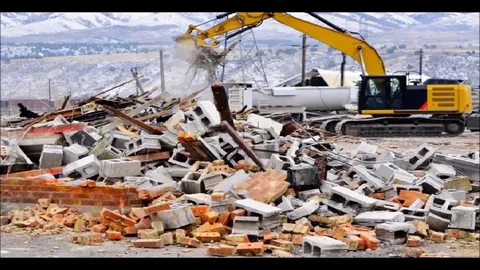In an era where sustainability is no longer optional but essential, businesses are under increasing pressure to manage waste responsibly. From construction sites to retail renovations, the byproducts of commercial activity can be substantial — and if not handled correctly, they contribute to environmental degradation. Commercial Debris Removal plays a critical role in bridging the gap between productivity and environmental stewardship, ensuring that waste is not only removed efficiently but processed with sustainability in mind.
Companies like Junk People Atlanta have embraced this dual mission — providing efficient cleanup services while prioritizing eco-friendly disposal methods. Whether a business is remodeling an office, demolishing an old facility, or dealing with post-event cleanups, the right debris removal strategy is vital to both operational success and environmental protection.
Why Sustainability Matters in Waste Management
Waste management isn’t just about getting rid of trash. It’s about making conscious decisions to minimize environmental impact while still meeting operational demands. Sustainable waste solutions focus on reducing the volume of debris sent to landfills, maximizing recycling efforts, and repurposing usable materials.
Commercial Debris Removal companies equipped with specialized sorting systems and knowledge of local recycling regulations can ensure that a significant percentage of waste is diverted from landfills. This approach supports broader environmental goals, aligns with corporate social responsibility (CSR) objectives, and often complies with increasingly strict municipal waste disposal laws.
How Commercial Debris Removal Supports Sustainable Practices
The best Commercial Debris Removal services do more than load trucks with waste. They incorporate systematic processes designed to identify recyclable materials, handle hazardous waste safely, and ensure proper documentation of disposal methods. This is especially important in industries like construction, where debris often contains metals, wood, concrete, and plastics — all of which have recycling potential.
By working with service providers who maintain partnerships with certified recycling facilities, businesses can reduce their carbon footprint while also potentially lowering disposal costs. Additionally, sustainable debris management promotes community goodwill, as it demonstrates a company’s commitment to environmental responsibility.
Reducing Environmental Impact Through Strategic Waste Handling
One of the core benefits of engaging a professional debris removal service lies in its ability to manage waste at scale. Without a structured plan, construction waste and renovation debris can quickly overwhelm a project site, leading to inefficient operations and higher costs.
Eco-conscious Commercial Debris Removal services adopt strategies like:
- Sorting waste on-site to separate recyclables from general refuse.
- Utilizing fuel-efficient vehicles to reduce emissions during transportation.
- Coordinating with donation centers to give usable materials a second life.
- Adopting landfill diversion targets to measure and improve sustainability performance.
These steps not only improve waste handling efficiency but also make sustainability an integrated part of the project management process.
Compliance and Risk Management
Many industries operate under strict environmental regulations regarding how waste must be stored, transported, and disposed of. Failure to comply can result in hefty fines, legal consequences, and reputational damage. Partnering with an experienced Commercial Debris Removal provider ensures that every aspect of waste handling meets local and federal requirements.
From proper labeling of hazardous waste containers to maintaining disposal records, these companies take on the responsibility of regulatory compliance. This not only reduces legal risks but also allows businesses to focus on their core operations without the burden of waste-related complications.
Cost Efficiency Through Sustainable Debris Removal
A common misconception is that eco-friendly disposal methods are more expensive. In reality, sustainable Commercial Debris Removal can lead to significant cost savings over time. By recycling and reusing materials, businesses can reduce tipping fees associated with landfill use.
Furthermore, avoiding fines through proper compliance, and potentially earning tax incentives for donating reusable items, can make sustainable waste management a financially smart decision. In some cases, recovered materials can even be sold to offset removal costs.
Choosing the Right Commercial Debris Removal Partner
Not all debris removal services are equal. Businesses should look for providers with proven experience, documented sustainability initiatives, and a transparent disposal process. When evaluating a potential partner, consider the following factors:
- Recycling and Diversion Rates – Ask about their landfill diversion percentage and recycling capabilities.
- Equipment and Fleet – Ensure they have the right tools and vehicles to handle your type of waste efficiently.
- Certifications and Compliance – Verify that they meet or exceed all applicable regulations.
- Experience in Your Industry – Industry-specific knowledge can greatly improve efficiency and compliance.
- Clear Pricing – Look for transparent estimates with no hidden fees.
By making the right choice, you ensure that your debris is managed efficiently, legally, and with minimal environmental impact.
Long-Term Benefits of Sustainable Waste Management
Beyond immediate cleanup needs, sustainable Commercial Debris Removal provides long-term benefits. Businesses that integrate eco-friendly waste management into their operations enhance their reputation, strengthen relationships with environmentally conscious clients, and contribute to a cleaner community.
These efforts also align with broader corporate initiatives such as ESG (Environmental, Social, and Governance) reporting, which is increasingly important to investors and customers alike.
Conclusion
The growing emphasis on environmental responsibility makes Commercial Debris Removal an essential part of sustainable waste management. By partnering with the right service provider, businesses can ensure efficient operations, meet compliance requirements, and significantly reduce their environmental impact. Sustainable debris removal isn’t just about keeping sites clean — it’s about shaping a greener future while maintaining operational efficiency.
With professional expertise, industry knowledge, and eco-conscious strategies, commercial debris removal services can transform waste management from a logistical necessity into a positive environmental contribution.
Frequently Asked Questions
What qualifies as commercial debris?
Commercial debris includes waste generated from business operations, such as construction materials, renovation waste, packaging, old furniture, and general office cleanouts.
Can commercial debris be fully recycled?
Not all debris is recyclable, but a significant portion — including metals, concrete, wood, and certain plastics — can be diverted from landfills with the right handling.
Is commercial debris removal only for large projects?
No, services are available for projects of all sizes, from small office cleanouts to large-scale construction sites.
How can I ensure my debris removal is eco-friendly?
Work with providers who document their recycling processes, have partnerships with certified facilities, and prioritize landfill diversion.
Does sustainable debris removal cost more?
In many cases, it can actually save money by reducing landfill fees, avoiding fines, and repurposing materials.




